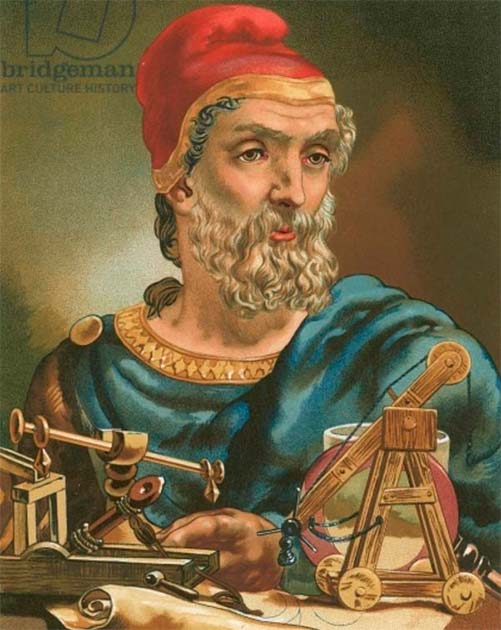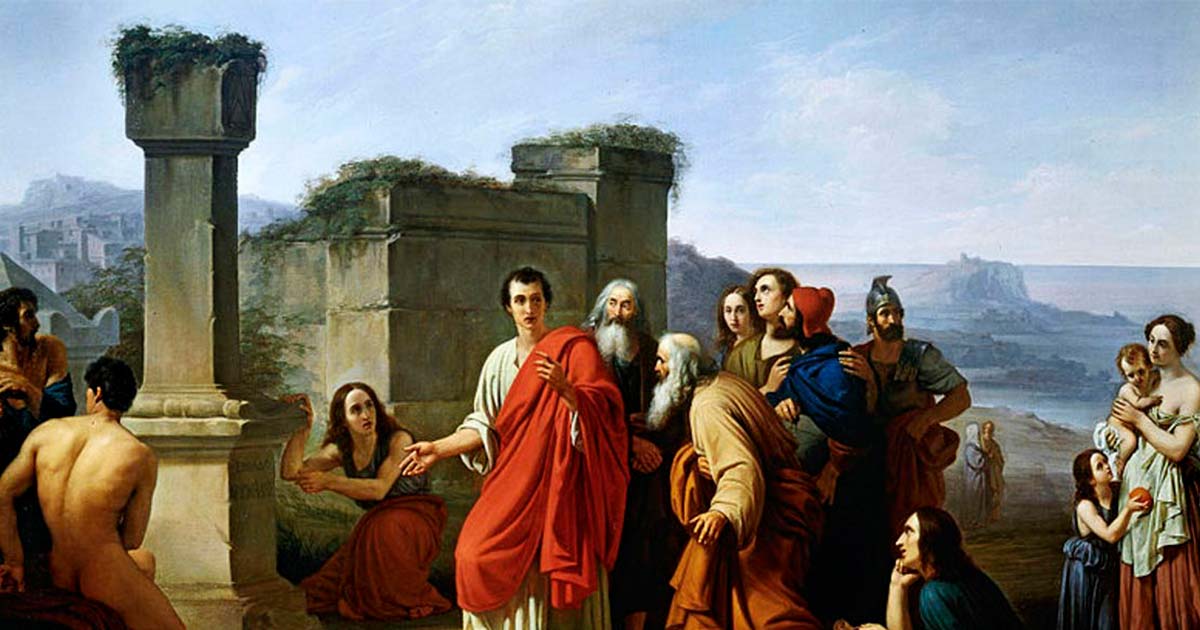Cicero and the Forgotten Tomb of Archimedes
The Romans were great admirers of the Greeks and their civilization. The emperor Nero, for instance, was a Philhellene who travelled extensively around Greece and even gave a huge tax-exemption to the province. Another Roman emperor, Caracalla, was obsessed with Alexander the Great, and sought to emulate his idol in many ways. These imitations, however, were not very successful, and at times even comical. Another way that Roman admiration for the Greeks could be expressed was through visiting the tombs of famous Greeks. Incidentally, this tradition itself has its precedence in the Greek custom of visiting the tombs of Homeric heroes. One famous example of a Roman visiting a Greek tomb was that of the Republican orator, Cicero. As a matter of fact, Cicero claimed that not only did he visit the tomb of Archimedes, but he actually re-discovered it after it had long been forgotten.
The Enigma of Archimedes' Life: Unraveling Historical Gaps
Archimedes was a mathematician, physicist, engineer, inventor, and astronomer, and is probably one of the most prominent scientific thinkers of the ancient Greek world. An anecdote about how he discovered the ‘Archimedes Principle’, and the accompanying catchphrase ‘Eureka’ (meaning ‘I got it’ in Greek) is one of the most famous stories about scientific discoveries. A famous tale recounts the discovery of the Archimedes principle, named after the scientist from Syracuse. According to the legend, while he was reclining in a bathtub, Archimedes realized that a body immersed in a fluid experiences an upward force equal to the mass of the displaced fluid. Overwhelmed with excitement by this revelation, it is said that he dashed out into the street without any clothing, proclaiming the iconic 'Eureka!' or 'I found!' to express his joy.

Archimedes' Principle' or the 'Principle of Buoyancy'. Vignette from the title of Italian page "Historical and critical information about the life, inventions and writings of Archimedes of Syracuse" by Count Giammaria Mazzuchelli (1707-1765), published in Brescia, Italy in 1737. (Public Domain)
Apart from his contributions to scientific knowledge and his inventions, including a screw pump, compound pulleys, and defensive war machines, as the stone throwing crane among many others, little is known about the life of Archimedes.

Portrait of Archimedes by Luis Figuier, 1881 (Public Domain)
According to the available sources, Archimedes was born around 287 BC in the city of Syracuse, Sicily. At that time, the city was an autonomous Greek colony of Magna Graecia. Although it is known that a biography of Archimedes was written by his friend, Heracleides, this work is not in existence, hence the lack of details about the life of this great thinker.
- Archimedes: An Ancient Greek Genius Ahead of His Time
- More than fifty ancient Greek inventions brought to life through incredible reconstructions
Conflicting Narratives: The Two Versions of Archimedes' Death
Archimedes died around 212 BC, a casualty of the Second Punic War. This was a war fought between Rome and her rival in the Mediterranean, Carthage, towards the end of the 3 rd. century BC. As Syracuse was an ally of the Carthaginians, it was besieged by the Romans, and finally fell after two years.

Archimedes directing the defenses of Syracuse by Thomas Ralph Spence, 1895 (Public Domain)
According to Plutarch’s account, Archimedes was killed by a Roman soldier when he declined to meet the victorious Roman general, Marcellus. The reason for this refusal was supposedly due to his contemplation of a mathematical diagram, and his wanting to solve that problem, rather than meeting the general. Plutarch also mentions an alternate version of the story, in which Archimedes was killed whilst attempting to surrender to the Romans. According to this version of the story, Archimedes was carrying some mathematical instruments, which were mistaken as valuable items by a Roman soldier, hence resulting in his death. The news of Archimedes’ death, however, was not well received by Marcellus, who recognized Archimedes as a great scientific thinker, and had ordered that he should not be harmed.

The Death of Archimedes by Thomas Degeorge, 1815 (Public Domain)
Decoding Inscriptions: Cicero's Key to Archimedes' Tomb
The visit of Cicero to the tomb of Archimedes can be found in the Roman orator’s Tusculan Disputations, a series of books written with the aim of popularizing Stoic philosophy. According to the account, Cicero was in Sicily serving as a quaestor. During his tenure there, he decided to visit the tomb of Archimedes. The Syracusans, however, were unaware of this tomb, and denied that it even existed. Cicero then decided to search for the tomb, and managed to find it near the Agrigentine Gate. Cicero identified the tomb based on some lines of verse he heard were inscribed on the monument. The inscriptions stated that there was a stone cylinder and sphere on the tomb, which enabled Cicero to locate Archimedes’ tomb.
- Developer Plans to Use Ancient Technology to Harness Hydropower
- 6 Advanced Ancient Inventions Beyond Modern Understanding

Cicero and the magistrates discovering the tomb of Archimedes by Benjamin West, 1796 (Public Domain)
Whilst this story may seem to be about a lost tomb being discovered by a Roman orator, it has a more important point to make, as it is found in Cicero’s Tusculan Disputations.

The so-called "Archimedes tomb" in Syracuse, from the Roman imperial age. (Carlo Pelagalli/CC BY-SA 3.0)
In fact, Cicero mentions that his story about discovering Archimedes’ tomb was a digression from the subject he was writing about. This subject was the promotion of the pursuit of knowledge over material riches. Archimedes, as well as other Greek thinkers such as Democritus, Pythagoras and Anaxagoras were compared to tyrants, and Cicero declared that the lives of the former were preferable to those of the latter.
Top image: Painting by Paul Barbotti (1821-1867), depicting the scene of Cicero as he discovers the tomb of Archimedes forgotten by the Syracusans. Source: Public Domain
By Ḏḥwty
References
Jaeger, M., 2002. Cicero and Archimedes' Tomb. The Journal of Roman Studies, Volume 92, pp. 49-61.
Project Gutenberg, 2005. Cicero's Tusculan Disputations, Also, Treatises on the Nature of the Gods, And On the Commonwealth. Available at: https://www.gutenberg.org/files/14988/14988-h/14988-h.htm
Unknown. 2012. Archimedes. Available at: https://www.ancientgreece.com/s/People/Archimedes/
Unknown. 2014. Tomb of Archimedes. Available at: https://www.math.nyu.edu/~crorres/Archimedes/Tomb/Cicero.html
Wikipedia, 2014. Archimedes. Available at: https://en.wikipedia.org/wiki/Archimedes
Wikipedia, 2014. Cicero. Available at: https://en.wikipedia.org/wiki/Cicero




















Comments
So where is His tomb ??? And where is Cicero's tomb also ?
marker must still be there ! Since it marks a tomb and Cicero once found it, he would certainly make sure it stayed labeled and protected, no ?
Awesome article. The pursuit of knowledge is way more rewarding than the pursuit of riches.
Peace and Love,
Ricky.